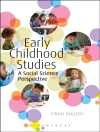The modern world is saturated with images. Scientific knowledge of the human body (in all its variety) is highly dependent on the technological generation of visual data – brain and body scans, x-rays, diagrams, graphs and charts. New technologies afford scientists and medical experts new possibilities for probing and revealing previously invisible and inaccessible areas of the body. The existing literature has been successful in mapping the impact and implications of new medical technologies and in marrying the visual and the body but thus far has focused only narrowly on particular kinds of technology or taken only a purely textual/visual (cultural studies) approach to images of the body. Combining approaches from three of the most dynamic and popular fields of contemporary social anthropology – the study of the visual, the study of the technological and the study of the human body – this volume draws these together and interrogates their intersection using insights from ethnographic approaches. Offering a fascinating and wide range of perspectives, the chapters in this volume bring an innovative focus that reflects the authors’ shared interest in ‘the body’ and visualising technologies.
Table of Content
List of Figures and Tables
Preface and Acknowledgements
Chapter 1. Technologized Images, Technologized Bodies
Jeanette Edwards, Penny Harvey, and Peter Wade
Chapter 2. Pharmaceutical Witnessing: Drugs for Life in an Era of Direct-to-consumer Advertising
Joseph Dumit
Chapter 3. Picturing the Brain Inside, Revealing the Illness Outside: A Comparison of the Different Meanings Attributed to Brain Scans by Scientists and Patients
Simon Cohn
Chapter 4. Embodied Brains: Why Science Studies Needs the Anthropology of Museums
Anne Lorimer
Chapter 5. Spectacles of Reason: An Ethnography of Indian Gastroenterologists
Stefan Ecks
Chapter 6. Technokids? Insulin Pumps Incorporated in Young People’s Bodies and Lives
Griet Scheldeman
Chapter 7. Wearable Augmentations: Imaginaries of the Informed Body
Ana Viseu and Lucy Suchman
Chapter 8. ‘Embryos Are Our Baby’: Abridging Hope, Body and Nation in Transnational Ova Donation
Michal Nahman
Chapter 9. Living Differently in Time: Plasticity, Temporality and Cellular Biotechnologies
Hannah Landecker
Notes on Contributors
Index
About the author
Peter Wade is Professor of Social Anthropology at the University of Manchester. His publications include Race and Ethnicity in Latin America (1997); Music, Race and Nation (2000); Race, Nature and Culture (2002); and Race and Sex in Latin America (2009).












